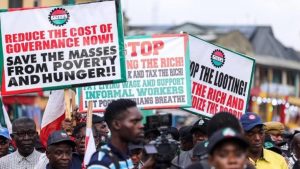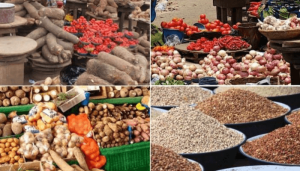*N2.06trn realised as revenue in Q1 *97% higher than Q1 2023 revenues *Annual inflation at 34%, food inflation at 35%

Chuks Isiwu, Michael Eboh & Mkpoikana Udoma
Lagos/Port Harcourt/Dublin — Nigeria’s earnings from oil and gas appreciated by 96.62 percent to N2.057 billion in the first quarter of 2024, compared with N1.046 trillion recorded in the same period in 2023, according to data released by the Central Bank of Nigeria, CBN.
The increased revenue is coming at a time of unprecedented hardship, ferocious hunger, galloping inflation and dwindling jobs in the country, which recently prompted hundreds of thousands of people to take to the streets in a nationwide protest that, according to Amnesty International, claimed 22 lives.
The protests, specifically, came after data showed annual national inflation at 28-year high of 34.19 percent in June and food inflation surged to 35.41 percent in January this year from 33.9% in December 2023.
Businesses are still counting their losses from the hunger protest originally planned to last for 10 days, but suffered fits and starts across the country after take-off on August 1 following a crackdown by the security agencies.
The CBN, in its Quarterly Economic Statistics for the First Quarter of 2024, also said oil revenue for the period under review was 21.05 percent higher than the N1.699 trillion earned from the petroleum industry in the fourth quarter of 2023.
Giving a breakdown of oil earnings in the first quarter of 2024, the CBN noted that in January and February, gross oil revenue stood at N476.549 million and N829.42, while March 2024’s oil earnings stood at N750.74 billion.
In comparison, in the fourth quarter of 2023, oil revenue of N665.344 billion, N396.548 billion and N637.117 billion were recorded in October, November and December; while in the first quarter of 2023, the country earned N675.283 billion, N205.062 billion and N165.703 billion in January, February and March 2023 respectively.
Furthermore, the CBN disclosed that after deductions, the country’s net earnings from the oil sector stood at N1.88 trillion in the first quarter of 2024, rising by 110.52 percent compared with N895.08 billion recorded in the first quarter of 2023; while it rose by 20.09 percent compared with N1.569 trillion recorded in the fourth quarter of 2023.
Specifically, the bank stated that in January, February and March 2024, net oil earnings after deductions stood at N443.143 billion, N777.802 billion and N663.346 billion, respectively; compared with N604.610 billion, N371.611 billion and N592.832 billion in October, November and December 2023; while in January, February and March 2023, net oil earnings after deductions stood at N584.658 billion, N172.332 billion and N138.090 billion, respectively.
The CBN reported that crude oil sales fetched the country N106.99 billion in the first quarter of 2024, compared with zero earnings for both the first and fourth quarter of 2023.
Furthermore, the banking sector regulator disclosed that the country earned N592.675 billion from oil royalties in the first quarter of 2024, rising by 11.17 percent compared with N533.107 billion recorded in the first quarter of 2023 and 20.98 per cent higher, compared with royalties of N489.885 billion recorded in the fourth quarter of 2023.

The bank added that the country earned N3.402 billion from rent in the petroleum sector in the first quarter of 2024, rising by 155.72 per cent compared with N1.33 billion in the first quarter of 2023 and 90.7 percent higher than the N1.784 billion recorded in the fourth quarter of 2023.
The CBN also stated that in the first quarter of 2024, the country earned N40.564 billion from gas flare penalty; N402.715 billion from miscellaneous, pipeline fees and other oil and gas revenue; and N366.929 billion from Petroleum Profit and Gas Tax.
In comparison, in the first quarter of 2023, earnings from gas flare penalty miscellaneous, pipeline fees and other oil and gas revenue; and Petroleum Profit and Gas Tax stood at N12.889 billion, N2.202 billion and N791.591 billion, respectively; while in the fourth quarter of 2023, revenue from gas flare penalty miscellaneous, pipeline fees and other oil and gas revenue; and Petroleum Profit and Gas Tax stood at N26.543 billion, N423.427 billion and N135.674 billion.
Hardship, hunger, spiralling inflation
Despite the earnings from oil and gas, hardship and hunger are taking a serious toll on the populace, a situation worsened by spiralling inflation.
According to reports. Nigeria’s hunger statistics has been rising since the last six years. For instance, 10 percent of the Nigerian population reportedly suffered severe hunger in 2017. This rose to 10.40 per cent in 2018, reaching 12 percent in 2019.
In year 2020, the number of the Nigerian population reportedly suffering severe hunger had risen to 12.70 percent, and between 2020 and 2022, it had climbed to 21.3 percent.
Going by the World Food Programme, WFP, projections, about 26.5 million Nigerians are expected to face acute hunger in 2024, compared to 18.6 million people in 2023.
Reports also indicate that as a result of conflicts, insecurity, rising inflation and the impact of the climate crisis, hunger is being driven up in Nigeria – 26.5 million people are projected to face acute hunger in the June-August 2024 season across the country.
The WFP also reports that the number of food-insecure Nigerians increased significantly, from 66.2 million in Q1 2023 to 100 million in Q1 2024, with 18.6 million facing acute hunger and 43.7 million showing crisis-level or above crisis-level hunger coping strategies as of March 2024.
Also, the Nigerian Economic Summit Group, NESG, in its policy brief, “Status of Food Security: Dimensioning the Crisis, Policy Options, and Strategic Responses,” said there is need for urgent measures to address the food crisis in Nigeria.
It said that in January 2024, Nigeria’s food inflation surged to 35.41 percent from 33.9 percent in December 2023. “The number of food-insecure Nigerians increased significantly, from 66.2 million in Q1 2023 to 100 million in Q1 2024 (WFP, 2024), with 18.6 million facing acute hunger and 43.7 million Nigerians showing crisis-level or above crisis-level hunger coping strategies as of March 2024. This unprecedented crisis demands immediate humanitarian, social protection, and food systems responses<” the NESG stated in the brief.
N70,000 minimum wage vs cost of living
The cost of food and other items as well as the general cost of living have gone up astronomically.
A juxtaposition of the N70,000 minimum wage recently announced by the Nigerian government with the nation’s economic situation reveals its low purchasing power.

For instance, a recent report by the National Bureau of Statistics, NBS, on national pricing of petroleum products showed the average retail price per litre of household kerosene paid by consumers in June 2024 was N1,555.11, implying that the newly approved minimum wage of N70,000 could buy only 45 litres of kerosene.
The NBS said in the report that the highest average price of kerosene in June 2024 was recorded in Kaduna where the product sold for N2,072.92 per litre, meaning that the minimum wage can buy only 33.7 litres of product there, and 56 litres in Kebbi State, which recorded the lowest price at N1,248.15 per litre.
Similarly, the average retail price for refilling a 12.5 kilogramme, Kg, cylinder of the Liquefied Petroleum Gas, LPG, popularly known as cooking gas, was N15,736.27 in June, and this would mean that the new minimum wage can buy only 56kg of gas or refill the 12.5kg cylinder four times.
On state profile analysis, the NBS report indicated that Cross River recorded the highest average retail price for the refilling of a 12.5kg cylinder of the LPG at N16,888.89 per litre, which shows that the N70,000 minimum wage can buy 51.8kg and 60kg of the cooking gas in Bauchi State which recorded the lowest average price at N13,450.
According to NBS also, the national average cost of a healthy diet, CoHD, was N1,241 in June 2024, which indicates that the newly approved minimum wage can buy it only 56 times, which is approximately 19 days for three square meals a day.
According to NBS, the Cost of a Healthy Diet, CoHD, is the least expensive combination of locally available items that meets globally consistent food-based dietary guidelines.
CoHD is used as a measure of physical and economic access to healthy diets, and it is a lower bound (or floor) of the cost per adult per day, excluding the cost of transportation and meal preparation.
NBS admitted that in recent months, the CoHD has risen faster than general inflation and food inflation, noting that the N1,241 price in June 2024 is 19.2% higher than the N1,041 recorded in May 2024.
In June 2024, the average CoHD was highest in the South West of the country at N1,545 per adult per day, which means the N70,000 minimum wage can buy it 45 times, compared to N956 per adult per day in North West, which the new minimum wage can buy 73 times.
Selected food price watch for June 2024 shows that the average price of 1kg beans brown (sold loose) stood at N2,292.76, which would mean that the new minimum wage can buy only 30.5kg of beans which is approximately half a bag.
This article was originally posted at sweetcrudereports.com
Be the first to comment